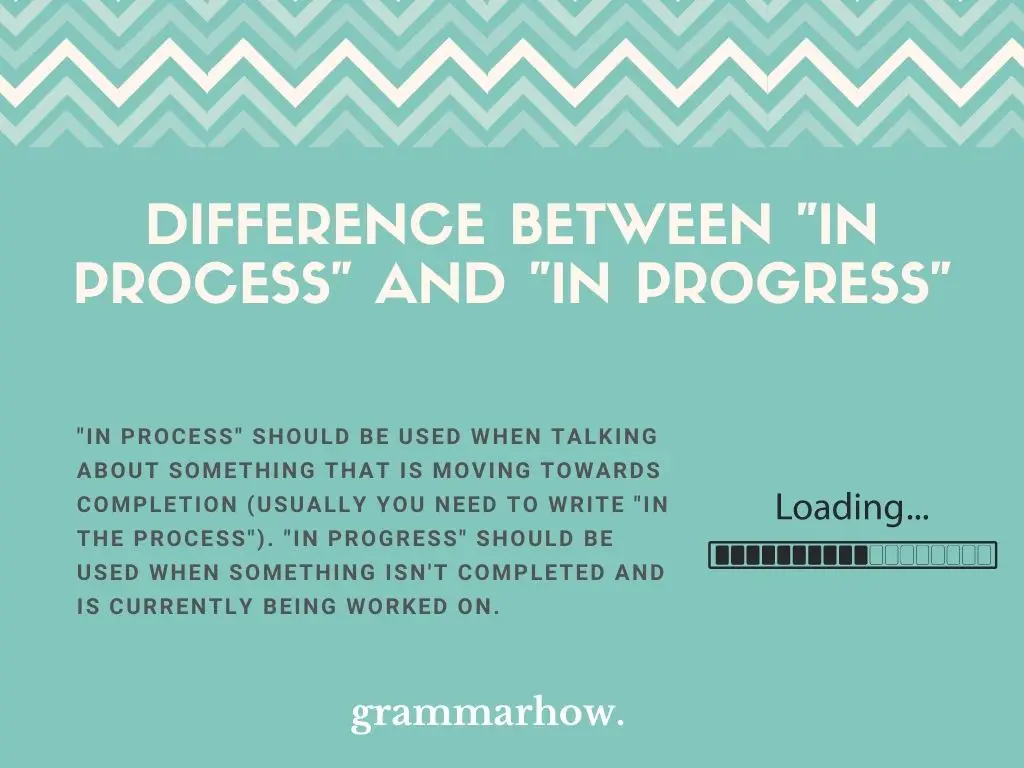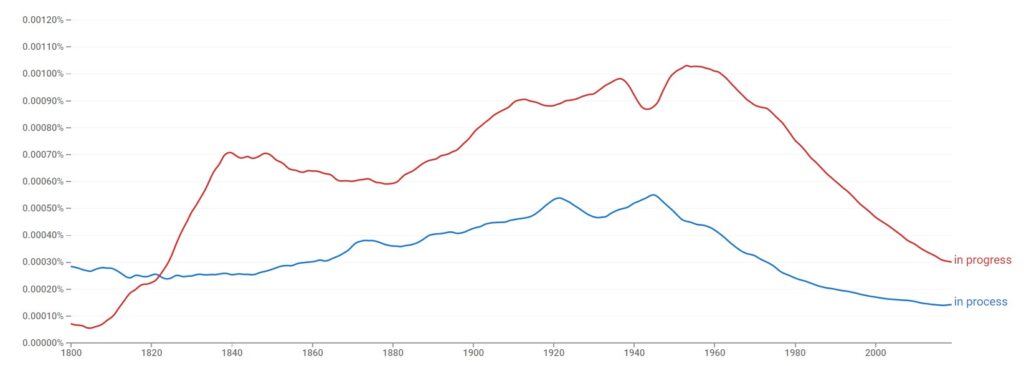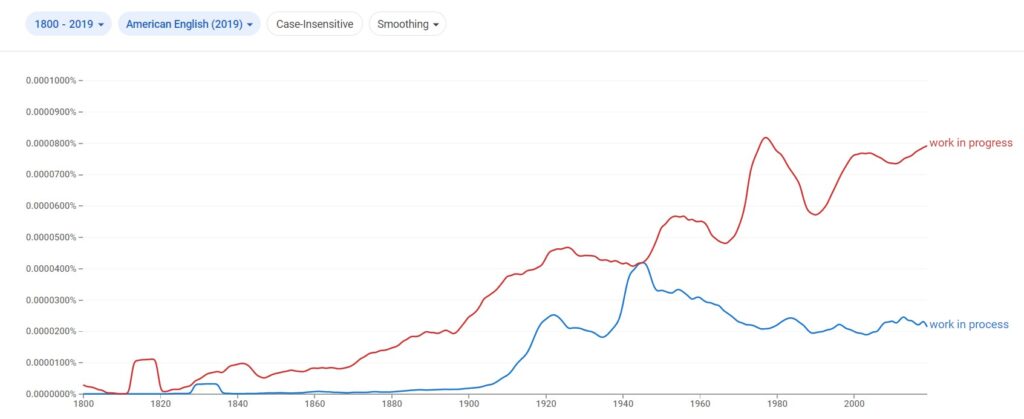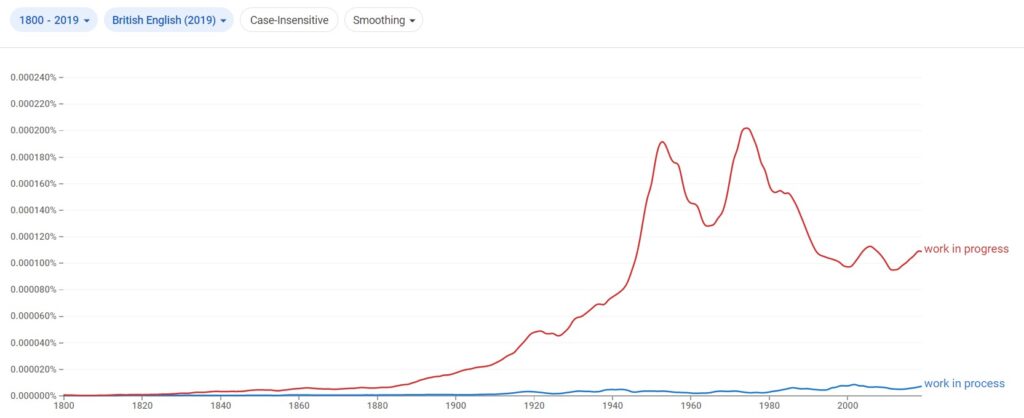The two phrases “in process” and “in progress” are similar in some ways. They are both used to refer to things getting closer to a state of completion. However, they are also different in how you can use them, and it’s important to know what that difference is.
What Is The Difference Between “In Process” And “In Progress”?
“In process” should be used when talking about something that is moving towards completion (usually you need to write “in the process”). “In progress” should be used when something isn’t completed and is currently being worked on.

It’s more common to see “in progress” written down, whereas you’ll see “in the process” more often than anything else. This distinction will become more clear as we proceed.
According to The Cambridge Dictionary, “process” means “a series of actions that you take in order to achieve a result.” That means if something is “in process,” we’re working towards achieving the end result of it.
Alternatively, according to The Cambridge Dictionary, “progress” means “movement to an improved or more developed state, or to a forward position.” While the end result is always the same with both words, “progress” talks about the current state compared to the future completion.
Also, if you look at this graph, you’ll be able to see the difference in usage between the two phrases over the last two centuries. “In progress” is the more popular choice and has been since about 1820. Both words are slowly being used less, but “in progress” is the most popular.

What Does It Mean If Something Is “In Process”?
Now that we’ve covered the main differences, we’ve got a chance to explain the meanings to you in more detail. We’ll start with the less common word “in process.”
“In process” means that something is proceeding towards a state of completion. Usually, that completed state isn’t that far away, or there is a reasonable plan to get there relatively quickly. It’s most common to write “in the process.”
The phrase “in process” isn’t a common one to come across. In fact, you’ll only see it in very specific cases in written English. If you want to use it correctly, it makes more sense to write that something is “in the process” of finishing or completing.
- My computer is in process of completing the download.
- My computer is in the process of completing the download.
You can see from these two examples that “in the process” is by far the most popular choice. This isn’t a case where “in process” works very well, so it shouldn’t be used here.
How To Use “In Process” In A Sentence
It would help to look at some examples of the phrase in sentences as well. We’ll include a few variations so that you can see how it works in a few instances.
- We’re sorry, but the works are still in process.
- We’ve still got your documents in process.
- We’re in the process of remodeling the house.
- You’re in the process of moving, aren’t you?
- These assignments are in process and will be completed soon.
- We’re in the process of figuring out our next steps.
We used both “in process” and “in the process” to show you when the two phrases are used differently. As we said, it’s much more likely to come across the phrase “in progress,” but that doesn’t mean there aren’t still appropriate times to use “in process” in your writing.
If something is on its way to completion, then it is proceeding towards completion. The word “process” is related to the present participle “proceeding,” which is why we’re able to say it in this way.
We use “in process” in sentences to say that something is moving towards a state of completion.
What Does It Mean If Something Is “In Progress”?
The more common phrase of the two is “in progress.” You saw in the graph earlier that “in progress” is the most popular, so we’ll look at what makes it that way in the following sections.
“In progress” means that something is currently being worked on towards a state of further development or completion. Usually, completion isn’t guaranteed; we’re simply saying that we’re working on furthering the progress of something towards an end goal.
The words “progress” and “process” are very similar, but the end intention of both is what sets them apart. Usually, “in process” refers to completing something, whereas “in progress” can refer to simply moving forwards but not necessarily reaching the end (at least not for a while).
That’s part of the reason why “in progress” is the more common choice of the two. We usually prefer to say that we’re moving to the next step rather than admitting that we’re close to completing something. That way, we don’t have to be held accountable if we miss a deadline or don’t finish something when we intended to.
How To Use “In Progress” In A Sentence
It’ll help you to see “in progress” in a sentence to really tell the differences apart. We’ll include a couple of different variations, some of which you might already be familiar with.
- The work is currently in progress, so we’ll get back to you when it’s closer to completion.
- We’re in the progress stages of this project, so don’t expect anything straight away.
- This building is a work in progress, and it’s incredibly dangerous to be around it without a hardhat.
- The new school is still in progress.
- We’re working on it, so we’ll give you an in progress update soon.
- This whole building is in progress; please be careful where you step.
As you can see from these examples, we use “in progress” when we’re not quite ready to announce a date or time of completion on a project. “In progress” simply means that we’re working towards a goal, but otherwise, we’re not sure when that goal will be achieved.
“In progress” takes away the problem of missing deadlines. We’re only saying that we’re working on something rather than saying that we’re ready to complete it soon.
How To Choose Between Using “In Process” And “In Progress”
So, how do you choose between using the two phrases? They’re both fairly similar, so we can understand why it might be difficult for you to figure out which one works best in which case.
“In process” should be used when you have an idea of when a task will be completed. You can give someone an update on the process in this way. “In progress” should be used when you don’t know when a task will be completed, but you’re still happy to work on it.
Usually, “in process” is the more final of the two. It’s implied that you’re closer to finishing than you would be if you said something like “in progress.”
Also, “processes” work much better for computer information and data, so you can use “in process” to talk about data collection activities and tasks too.
What Is The Difference Between “Work In Progress” And “Work In Process”?
Perhaps one of the more common phrases you might have heard associated with these phrases is “work in progress.” There are a few differences between how you use it, and those differences become more apparent based on whether you use American or British English.
If you look at this graph, you can see how the two phrases are used in American English. “Work in progress” is the most popular choice because it talks about working towards the next stage of development rather than giving an absolute deadline.

“Work in process” is still a fairly common saying in American English, but it’s not nearly as popular as “work in progress.” It mostly depends on the context that you’re using when it comes to writing one over the other.
If you look at this graph, you can see that there’s a much more substantial difference between the phrases in British English. In British English, “work in progress” is the only acceptable phrase, and “work in process” is rarely used.

With that said, both phrases are interchangeable in American English, while “work in progress” is the only choice to use in British English.
Example Usage
Let’s finish with some examples of “work in progress” or “work in process” being used. Remember, these are both interchangeable in American English, so we’ll show you how they look.
- We’re sorry, but this building is a work in progress.
- We’ve got a lot of work in process in these parts, so you must be careful.
- That site is a work in progress, so don’t mess around in there.
- My game is a work in process, but I’ll update you with the new things when I’ve played through them.
- My project is a work in progress, so it’s just a mess!
From these examples, we can see just how easy it is to use both phrases interchangeably. It’s up to you which one you prefer to use.
However, if you’re going to use either one, make sure you’re using American English. If you’re using British English, most native speakers will see “work in process” as an incorrect saying and will ask you why you used it instead of “work in progress.”
You may also like:
10 Good Synonyms For “Speeding Up The Process”
Progress In vs. Progress On vs. Progress Of

Martin holds a Master’s degree in Finance and International Business. He has six years of experience in professional communication with clients, executives, and colleagues. Furthermore, he has teaching experience from Aarhus University. Martin has been featured as an expert in communication and teaching on Forbes and Shopify. Read more about Martin here.
